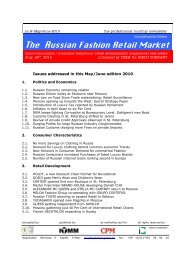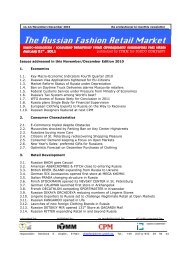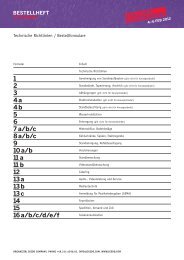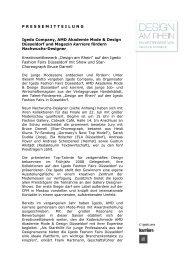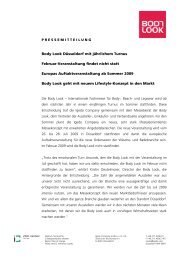The Russian Fashion Retail Market - Igedo Company
The Russian Fashion Retail Market - Igedo Company
The Russian Fashion Retail Market - Igedo Company
Create successful ePaper yourself
Turn your PDF publications into a flip-book with our unique Google optimized e-Paper software.
1.4. Imports back on the growth path<br />
September 2010, cisstat.com, first semester key macro indicators<br />
As it is commonly known due to the lack of diversified industry basis, Russia is<br />
highly dependant on imports of both, industrial products and consumer goods.<br />
From 2000 till 2008, imports from third countries, excluding CIS-nations rose at<br />
an average annual rate of 29 per cent . <strong>The</strong> peak was reached in 2007, when<br />
imports surged by 47 per cent against 2006. In 2008 growth slowed down by 23<br />
per cent against the year before an it plummeted at a rate of 37 per cent in 2009.<br />
<strong>The</strong> turnaround has been reached over the first quarter of this year, when imports<br />
from third countries rose by 17,2 per cent compared to the first three months of<br />
2009. At the end of the first semester of this year imports picked up at a<br />
cumulated rise of 28, 6 per cent.<br />
1.5. Capital investments keep increasing: higher yields<br />
August 30, 2010, Handelsblatt/Investment Strategies<br />
According to Matthias Siller, manager of Barings Russia Fund, the country is the<br />
cheapest market for investors at a time right now when fundamental economic<br />
data for Russia are commonly considered as very convincing. As Siller says, global<br />
portfolio investors find no way around Russia for getting higher yields than here.<br />
Shocked by the Euro-crisis in May, this year, global institutional investors jumped<br />
on <strong>Russian</strong> government bonds issued in Roubles and US Dollars, bringing the<br />
investor an annual yield of 5,4 per cent. According to Segei Arsenyev, analyst at<br />
Goldman Sachs, he expects high profit margins from investments in stock of<br />
<strong>Russian</strong> trading and retail companies selling consumer products as well as raw<br />
materials for industrial use.<br />
1.6. Inflation likely to rise<br />
3 rd Quarter 2010, <strong>The</strong> Global Blue Respective/ Handelsblatt<br />
Although monthly inflation came down from 8 per cent at the beginning of this<br />
year to 3,6 per cent in May, forecasts of the <strong>Russian</strong> Ministry of Finance aiming at<br />
an average inflation rate of 5 to 6 per cent for 2010, may not come true.<br />
According to the US economist Nourid Roubini, there are a number of indicators<br />
pointing at an overall inflation rate possibly reaching 8 per cent this year. Higher<br />
inflation than originally forecasted by the government may result from strong<br />
rising prices for wheat, other foodstuffs and basic commodities, raw materials,<br />
increase of salaries and wages such as from a declining US $ in combination with<br />
a stronger € and a weaker <strong>Russian</strong> Rouble.<br />
1.7. Fire devastation may cost Russia US $ 15 bn<br />
August 11, 2010, Stuttgarter Zeitung<br />
It is still premature to assess the economic and social damage caused by the<br />
heat-wave and forest fire devastation which have hit Russia in July and August<br />
2010. Experts speak of a cost burden of around US $ 15 bn resulting from this<br />
catastrophy. Almost any economy sector has been directly or indirectly affected.<br />
Mobile telephone providers were hit extremely hard because their networks<br />
collapsed under destroyed transmission posts, telephone cable and networks.<br />
Water supply was partially interrupted from the breakdown of power pumps.<br />
Consumption of electricity surged because air conditioners operated at their<br />
maximum capacity. In 27 <strong>Russian</strong> federal regions agriculture faces losses in crops<br />
of wheat and other foodstuffs accounting for 20 percent below average summer<br />
crops results. <strong>The</strong> government stopped wheat exports on August 5. This decree is<br />
valid until December 31, 2010. Russia is the fourth largest wheat exporter world<br />
wide and expects a negative effect on its balance of trade. According to Vladimir<br />
Milov, former federal energy minister and leader of the liberal opposition party<br />
3





